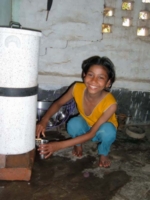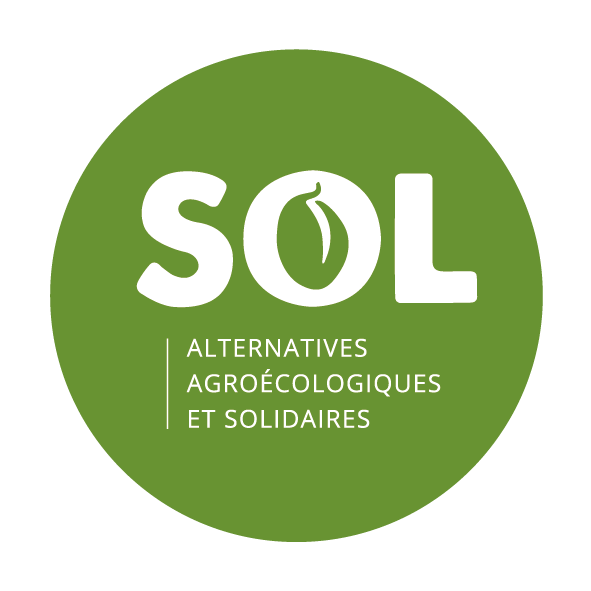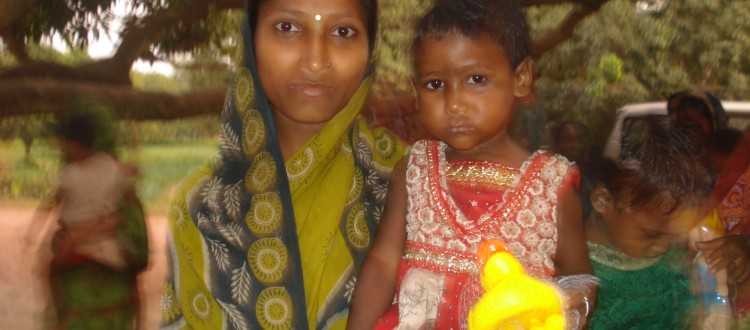INDIA The Children of Arsenic (2011-2015)
Support and Education for underprivileged children and adolescents affected by arsenic
Project Region: The Lalgola black, in the district of Murshidabad, about 2.5 hours from Calcutta and the Bangladeshi border.
Duration: from Mai 2011 to Mai 2015
Aim: Support and Educate underprivileged children and adolescents affected by arsenic
Beneficiaries: 180 children aged three to eight, and 55 adolescents, a total of 13,000 families.
Course of action:
• Education awareness for the families
• Support for primary schools and teacher training
• Opening a day-care center and a library
• Medical visits with follow-ups, prevention and treatment for the children
• Homework for the adolescents
• Extra-curricular activities concerning water and hygiene
• Professional training courses on sewing and embroidery for the young women
• Opening a mobile medical clinic
The Socio-economic situation:
The project took place in the area on the border between Bangladesh and India, where the amount of arsenic in the water is alarming. The area is the only one facing this problem in all of India and therefore it is not a priority problem and no financial resources are allocated to solve it. More than 104,000 people are concerned and in certain villages at least one person per household is a victim of arsenic-induced sicknesses. Nevertheless, the local population still thinks that the well water is pure because the arsenic doesn’t change its color, odor or taste.
Here are four stories:
1) Aisha began suffering from the pollution five years ago. Her husband, a day worker, is also affected as well as her son and daughter. WBVHA ed her to acquire a water filter which she uses for cooking and drinking water and the whole family feels a lot better.
2) Jyotsana Khatun was very severely affected by the arsenic pollution and lost several toes. She has since begun using a filter for the cooking and drinking water and she is doing much better.
3) Muniara was affected by the arsenic pollution for fifteen years. She now follows a multivitamin and dietary mineral treatment. She also acquired a water filter through WBVA which allows her to cook and drink potable water.
4) Mastura has three children and has suffered from the arsenic pollution for ten years. She now uses a water filter given to her by WBVHA for cooking and drinking water.
The program covers the geographical zone where the water is the most highly contaminated by arsenic. The families of Lalgola live below the poverty line; the illiteracy rate is about 50% of the population, 47% of whom are women which is a major handicap for them concerning the improvement of their living standards. It is also the major cause of the sanitary and hygiene problems which are also alarming.
Many children leave school to support their family. The girls are married young and the men leave the villages for the cities to find day jobs. In the area, large families are the norm, which forces the women to abandon their work to take care of the children.
The program:
In order to complete the national program “Education for All” (Sarva Shiksha Abhiyan), this project has put in place a primary education system which can easily be reproduced in other villages. The teachers are trained (methodology, educational tools, progress evaluation, health and hygiene, child development, etc.) and are ed to put in place the Montessori school model, which is much better suited to the need of underprivileged children (autonomy, responsibility, initiative, self-discipline, etc.).
Each student received, on top of an education, other forms of support: free medical treatment and follow-ups, hygiene courses, organized games between the primary schools (on the theme of water for example). Also, homework was provided for the adolescents in order to encourage them to stay in school.
A day-care centre was created which allowed the young women to look for jobs and also provided the opportunity to give medical attention to the very young children. It also s to prepare the children for primary school.
The adolescents who leave school often find work in the manufacture of cigarettes. Meanwhile, the young women suffer from discrimination, and are forced to become street beggars. A professional training course on sewing and embroidery was therefore organized in the villages in order to create shops.
Here are three stories:
1) Aslama (a bindi – Indian cigarette – roller) and her husband (unemployed) have three children: two daughters, Dulali Khatun (8 years old) and Sonali Khatun (5 years old) and one son, Somiru Sheq (13 years old). Their eldest child goes to the school at Lalgola thanks to the support of WBVHA and the two younger children go to the day-care centre.
2) Sarifa is 17 years old. Her mother rolls bindis and her father is a day-worker. She has finished the 10th grade and now wishes to have professional training. She thinks she will be able to improve her day-to-day life, be more independent. Her dearest wish is to become a social worker in her own village.
3) Sam Sunnahar is 16 years old. His mother rolls bindis and his father is a tailor. She finished middle school and now wishes to have more training in sewing, which she is already good at. The training course will allow her to become a sewing instructor.
The library that was created in the center of the city allows 5,000 students per year to have access to the necessary resources for their education. Former students donate books which increases the collection.
In order to ensure that the children are healthy, a mobile medical clinic passes through the village twice a week. Other than the various treatments that are provided, the clinic collects socio-economic information about the children by means of their health cards (treatments received, family members, etc.)

This program was implemented by our local partner WBVHA which has worked in the area for many years and works to reduce arsenic intoxication. In the past five years, the NGO has distributed 2,300 household water filters which allow a total of 13,800 people (7,000 of whom are children) to drink potable water. The filters were also given to 20 schools.
Local partner: WBVHA (West Bengal Voluntary Health Association)
Financial partner: The Air France Foundation
Read the presentation of the project in the Air France Foundation Report, p. 30 (in French).



